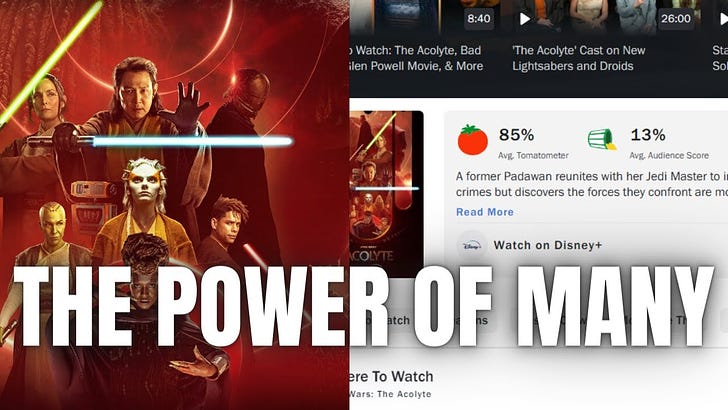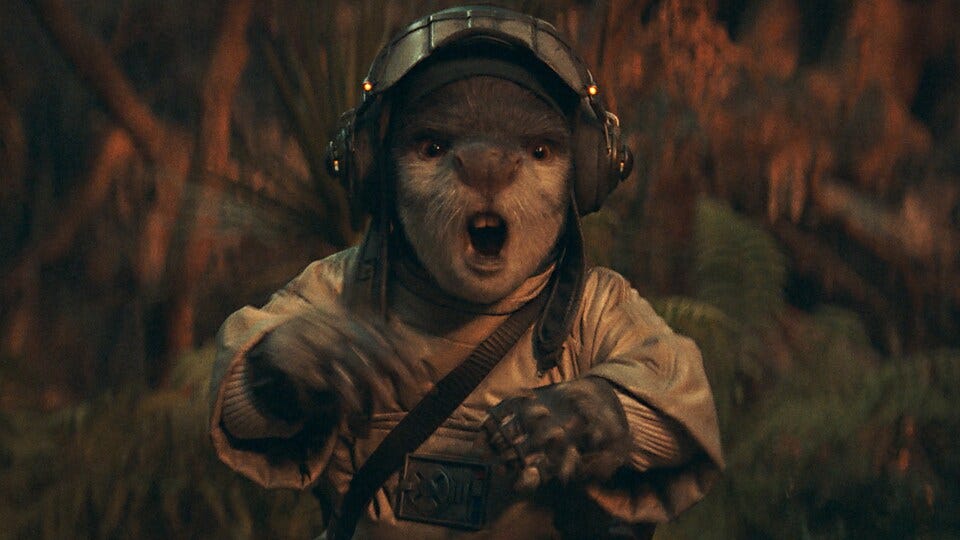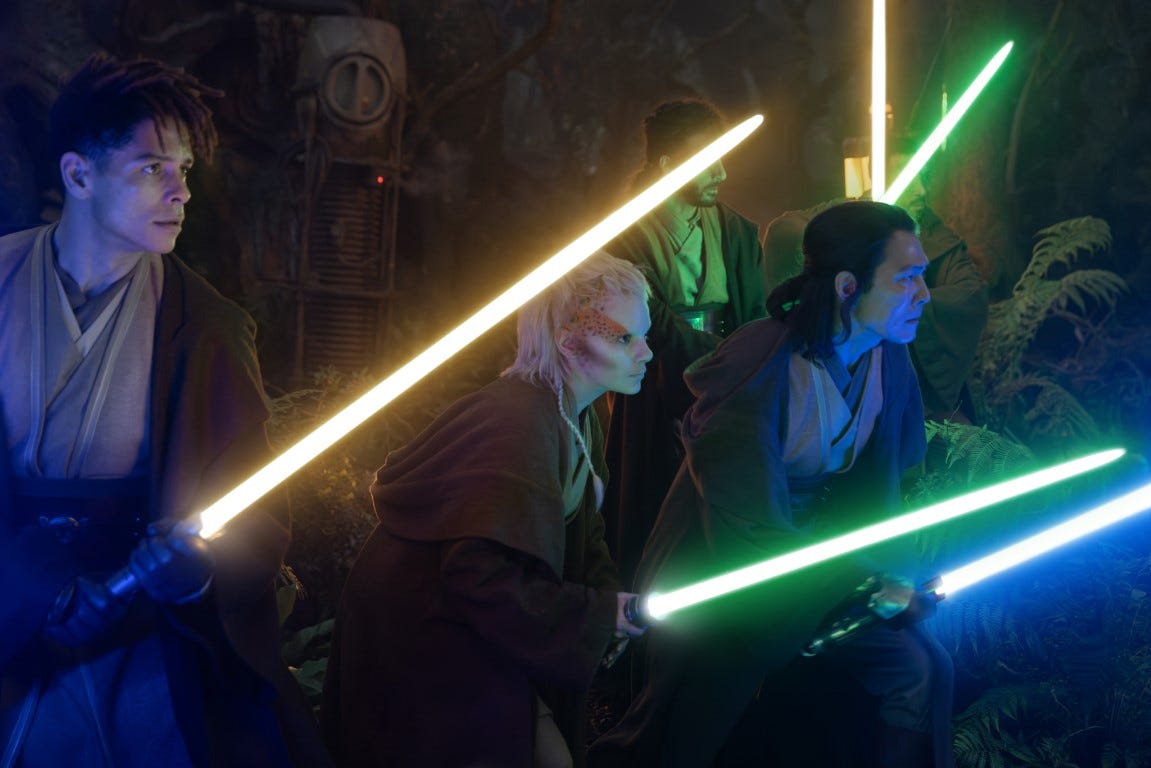'The Acolyte' Deserves Its Bad Rotten Tomatoes Audience Score
It may be review-bombing, but that doesn't mean it didn't earn it.
Star Wars fans are not happy with Disney’s latest venture into a galaxy far, far away. The Acolyte sports an 85% on Rotten Tomatoes—with critics—but is faring far worse with fans, who have bombed the series to a green pulp. 13% may be lower than this show deserves—I’d put it right there with Obi-Wan and Boba Fett personally—but I can’t blame fans for being angry. And I think review-bombing is a valid consumer tactic to let voices be heard, even if it’s often met with derision.
Many in the press and on social media are trying to pass this off as just another instance of angry fans showing their true colors as racist, sexist homophobes, and while that may be true at the very fringes, I think many fans have genuine concerns with the series (and many critics have expressed similar concerns, despite their reviews being counted as “Fresh” on Rotten Tomatoes). After all, these same fans have been pretty upset by shows like Halo, Obi-Wan Kenobi, The Book Of Boba Fett all of which feature white dudes as protagonists. In many ways, The Acolyte is just the cherry on top of a whole lot of built-up disappointment and disillusionment with the way Star Wars (and other beloved franchises) have been mismanaged so badly for so many years.
When True Detective: Night Country received a similar 92% with critics and 56% with audiences a lot of people wagged their fingers and said the same thing: “These are just a bunch of sweaty-palmed incels raging over a female-led fourth season. These are just Season 1 fanboys of the show’s creator who wasn’t involved this season, review-bombing the show out of spite. These are just racists etc. etc. etc.”
The reality is that Night Country was badly written, portrayed its female leads in a terrible light, and treated the indigenous Alaskans like stereotypes. HBO puts out a lot of terrific TV shows, and Night Country simply didn’t live up to that pedigree.
Then again, neither did Season 2 of the show, and people seem to forget that it scored even worse than Night Country with 47% critic / 27% audience scores. That was a season created by Nic Pizzolatto. Three of its four main characters white men (arguably, Rachel McAdams’ character Detective Bezzerides was the most popular of the four, though Colin Farrell’s deeply flawed Ray Velcoro was pretty great also).
This line of defensive narrative-building is par for the course when it comes to shows like The Acolyte and Night Country and other shows that boast diverse casts but objectively terrible scripts. The same happened with The Rings Of Power, which most people were upset about not because of black elves but because it felt like something ChatGPT would come up with rather than a story that shares a creative perch with J.R.R. Tolkien’s body of work.
It’s all gaslighting, or using the worst instances of noxious trolling to paint large swaths of fandom with the same broad brush. After all, I have plenty of examples of TV shows and movies that have gotten really great audience reception in recent years despite having diverse casts, LGBTQ representation and female leads.
These include, but are not limited to:
House Of The Dragon which is currently airing its second season on HBO and Max. This show has two strong female leads, a diverse cast, LGBTQ representation and yet somehow it has a 90% critic score (lower than The Acolyte and Night Country smh) and an 82% audience score on Rotten Tomatoes. Hmmm. (My review of Episode 2 is rather glowing).
Andor, which I consider the very best Star Wars since the original trilogy, and has an extremely diverse cast, is quite certainly the most left-leaning politics of any Star Wars ever created, LGBTQ representation and so forth, still manages a 96% critic score and an 87% audience score on Rotten Tomatoes, almost as if great storytelling trumps every other consideration.
Station Eleven, perhaps my favorite post-apocalyptic TV show of all time, which has an extremely diverse cast including female protagonists, LGBTQ representation, and lots of friggin Shakespeare, and has a 98% critic score and a 74% audience score on Rotten Tomatoes.
Fallout, based on the wildly popular video games and another fantastic post-apocalyptic show, has a lead female protagonist, a black protagonist and a ghoul protagonist, and has a 93% critic score (again, lower than The Acolyte because Rotten Tomatoes is broken) and a 90% audience score. We all love Lucy, it seems!
Happy Valley, a British crime drama with one of the strongest female protagonists I have ever seen in any television show or movie, and a white dude villain who is one of the most despicable antagonists of all time, boasts a 98% Rotten Tomatoes critic score and 95% with audiences. (Have I mentioned that you should really watch this show? YOU SHOULD).
Speaking of strong female leads, Furiosa: A Mad Max Saga was really great! While it bombed in theaters, critics gave it a 90% and audiences gave it an 89% on RT. I thought fans of these franchises hated women or something? What gives? (Fury Road has a 96% critic and 86% audience score, by the way).

There’s this whole faction of people on the internet who say things like “If Alien came out today, people would be angry that Ripley is a woman!” and I just find this extraordinarily disingenuous. Are there people who would say that? Of course. There’s always some clown who says “Too woke!” just at the scent of a woman in a film or TV show, or the sight of any diversity whatsoever, or to get rage clicks on YouTube. These are not true fans of Star Wars, which had Leia and Lando Calrissian way back in the 80s. This argument is just a strawman. Everybody knows that Ripley was one helluva talented badass female protagonist.
What most people want is pretty simple: Authenticity. We want adaptations of books we love to be authentic and true to the source material—not 100%, of course, there have to be changes from page to screen, but we want to see the creators of these shows make an honest try. That’s why people are so mad at The Witcher, for instance. It doesn’t feel like a sincere effort to adapt the books, whereas the video games feel incredibly true to the source material (while actually telling new stories in that universe).
As Game Of Thrones author George R.R. Martin wrote recently on Facebook:
Everywhere you look, there are more screenwriters and producers eager to take great stories and “make them their own.” It does not seem to matter whether the source material was written by Stan Lee, Charles Dickens, Ian Fleming, Roald Dahl, Ursula K. Le Guin, J.R.R. Tolkien, Mark Twain, Raymond Chandler, Jane Austen, or… well, anyone. No matter how major a writer it is, no matter how great the book, there always seems to be someone on hand who thinks he can do better, eager to take the story and “improve” on it. “The book is the book, the film is the film,” they will tell you, as if they were saying something profound. Then they make the story their own.
They never make it better, though. Nine hundred ninety-nine times out of a thousand, they make it worse.
It’s almost like a bunch of imposters have taken over our favorite IPs, determined to reshape these works to fit their own incredibly narrow worldview rather than just tell a great story and do justice to the source material or established franchise. (I’m not against subverting expectations, but that requires a clever screenplay and a delicate touch—again, see Andor).
With The Acolyte, which isn’t an adaptation, but rather an extension of a well-established IP, it simply doesn’t feel like an authentic piece of Star Wars. A lot of this just comes down to the mediocre writing, a problem across a lot of Star Wars. More and more people are becoming disenchanted with the House of Mouse’s shoddy stewardship of this beloved IP. We keep wondering when Bob Iger will wake up to reality and start making shows that fans actually want to watch. There’s a lot of money to be made. The missed opportunities are truly staggering.
On top of authenticity and fidelity to the source material, we want great storytelling. If The Acolyte had really great writing and didn’t feel so shockingly cheap, I think most fans would be happy or at least mollified.
Accusing people who aren’t on board of bigotry is a losing tactic. The problem with leveling that accusation all the time—and creating a narrative that is just accepted as fact rather than examined critically—is that you end up blurring the lines between genuinely upset fans and actual racists and misogynists, giving the real bigots cover while chasing away your audience.
If You Don’t Like It, Don’t Watch It!
All of this is why I find another common line—“If you don’t like it, don’t watch it”—equally absurd. I get this from fans all the time when I write a harsh review of a show or movie or video game that I think deserves a great deal of criticism. It’s obviously silly to say this to a professional critic, but I’d argue that it’s just as silly to tell fans to stop watching something just because they’re unhappy with it. I didn’t like Season 7 or 8 of Game Of Thrones but not watching it, even as a fan, was obviously not an option. I wanted to know what happened. We all did! And there was this hope wriggling about the back of our brains: Maybe it will get good again! How could I know this if I just didn’t watch?
Besides, if people just stop watching a show, it’s ratings will fall and that often leads to cancellation. Is that really what you want when you tell people “If you don’t like it, don’t watch it?” Also, isn’t this a bit like saying “If you don’t love America, leave it!”? Shouldn’t our instinct be a desire to improve? Since when is being a quitter a good thing?
It’s bizarre that we’ve started hearing showrunners and producers saying this exact same thing. The Boys showrunner Eric Kripke recently told The Hollywood Reporter, “I clearly have a perspective, and I'm not shy about putting that perspective in the show. Anyone who wants to call the show 'woke' or whatever, that's OK. Go watch something else. But I'm certainly not going to pull any punches or apologize for what we're doing.”

And that’s fine. Don’t apologize for what you’re doing, but maybe also don’t distill all your show’s criticism down to the lowest common denominator. Maybe—just maybe—it would be more useful to listen to the many smart critiques out there and ignore the “go woke you go broke” comments (and please, please don’t make a diss track about it).
I’ve seen a lot of people say—even diehard fans and people who share Kripke’s political views—that The Boys has gone from clever social commentary and satire to extremely on-the-nose political commentary. I’m enjoying Season 4, but it’s gotten a bit eye-rolly at times. The satire is still targeting the same people, but the delivery has lost its edge. Where once we were intrigued by the story’s sharp approach to corporate skullduggery and celebrity worship, now we’re being hit over the head with a blunt object.
And that’s why you see the Rotten Tomatoes score falling. And that’s why The Acolyte is doing so poorly. We want authenticity and great storytelling. People who are fighting for more diversity, equity and inclusion should want that just as badly if not more so rather than settling for bad scripts just because they feature women and minorities.
Women and minorities deserve great scripts, too. We all deserve better than the majority of Star Wars content lately, outside of Andor and Respawn’s Jedi games. It’s really not that hard to understand. This is the way.






I am generally very open minded, and find very rarely do I agree with the 'popularly touted opinion' however in this case the Acolyte, which given the context and the realm of the story I should love, it has the capacity to expose some deeply interesting parts of the lore, is just... mediocre. (I genuinely love the part in Fury Road when you realize the warboys are saying 'mediocre' because it's the highest praise they've ever received).
I want to like the show, but the narrative is genuinely shallow, the characters are wishy washy, and the 'big reveal' didn't surprise me at all, it seemed quite obvious the moment you first see them on screen.
The sisters feel flat... like they want to have emotions, but are confused how to express them. Maybe that's on purpose, but if it is it definitely isn't helping the show at the moment. The revenge plot is confusing. I'm genuinely hoping they can come up with a legitimate way to explain it, but the way they're leading up expectations it seems like it's going to just roll right into another misfire. The sith motivation is... almost as shallow as the rest of the show.
I keep hoping that the next episode is going to bring things together into a cohesive whole, or at least show some signs that it might be leading to something cohesive, but if that's the path they're taking they're going an awfully roundabout way to get there. The kind of roundabout that tends to lose half their audience before they finally bring it all together.
To be fair, there are some genuinely interesting tidbits in the show. Master Sol seems to be trying very hard to one handedly carry the show, but is struggling because even a legendary actor needs some kind of idea where the story is going. (I'm not stating that the actor is legendary, only that even a legendary actor would likely struggle under his circumstances. I am still giving him props for pulling the show along as much as he does.)
They failed to live up to one of the most obvious gimmicks they could have used to boost the shows ratings, though it is possible they may bring it back in cut scenes, if they don't it will be a sad day for all of Star Wars. The hell you going to even mention a Wookie Jedi, and not even bother to give him a fight scene? (and not the fledgeling from the clone wars/bad batch) I want to see the supposed sith lord struggling to match the might of the wookie master, this would only add more tension to see how easily he defeats the others. (sorry for rambling!)
For all the talk of "if you don't like it, don't watch" it kinda ignores that for the most part.... people aren't watching.
The Acolyte by all accounts seems to be one of the least watched Star Wars shows. She-Hulk (where many fans made the same arguments) similarly bricked. The problem is precisely because people aren't watching, and that's going to affect the future of the franchise.